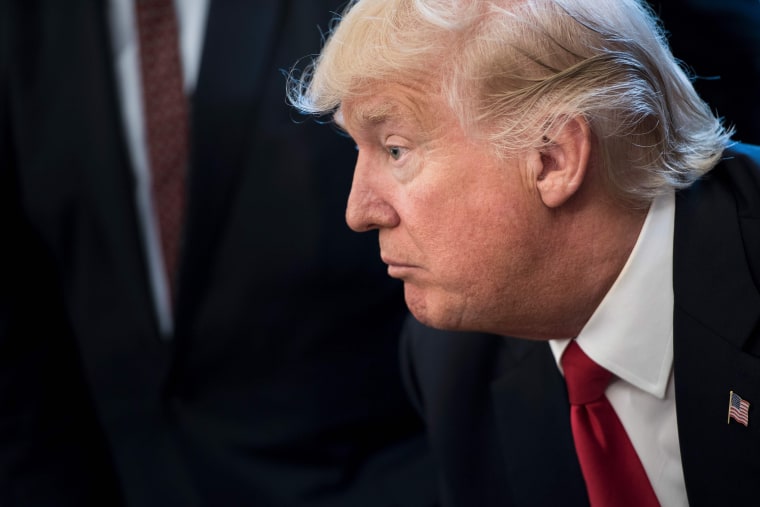Donald Trump has taken a look at his presidency, and he's convinced he's doing a great job. Before his cabinet meeting last week, in which members of his team took turns offering gushing praise for their leader, the president declared, “Never has there been a president, with few exceptions ... who has passed more legislation and who has done more things than what we’ve done."
Trump tweeted a similar message yesterday, insisting that his "MAKE AMERICA GREAT AGAIN agenda is doing very well." (Trump seems to have a special fondness for capitalized letters.) He specifically pointed to the number of bills he's signed and the "great" Supreme Court justice he named to the bench.
And while it's true Neil Gorsuch is now on the high court -- filling a vacancy of dubious legitimacy -- Trump's legislative accomplishments are hard to take seriously. An NBC News reported, "Three of those bills were appointing three members to the Smithsonian's board, another approved a war memorial, a fifth promoted women in entrepreneurship, and a sixth encouraged the display of the American flag on Vietnam War Veterans Day."
Hardly the stuff of presidential legend.
But at the core of Trump's defense of his presidency to date, over the weekend and in recent weeks, appears to be an unshakable belief that the economy can serve as a political life-preserver. Scandals and investigations may represent rising waters, but Trump seems to believe that the economy will keep him from drowning. The Washington Post reported:
President Trump is telling his supporters to concentrate on the economy — not an investigation into his campaign's relationships with Russian officials that has now expanded to include the president himself, as he acknowledged Friday morning. [...]“Despite the phony Witch Hunt going on in America, the economic & jobs numbers are great,” Trump wrote on Twitter Friday morning. “Regulations way down, jobs and enthusiasm way up!”
On the surface, this isn't a bad strategy -- a president's political standing is often tied to the health of the economy, or lack thereof -- but in Trump's case, it's not quite as easy as he'd like to believe.
First, the economy isn't nearly as strong as he likes to suggest. The economy is still adding jobs, for example, but the growth rate has slipped in recent months. Consumer confidence, meanwhile, has cooled, and even Trump administration officials concede there's simply no way the U.S. economy will grow as quickly or as strongly as the president claimed during his campaign.
Second, to assume that a healthy economy necessarily saves a struggling president is belied by recent history. In October 2006, for example, the month before that year's midterm elections, the unemployment rate was 4.4% -- which at the time was a five-year low. Economic growth that quarter was 3.2%, which reflected a pre-crash economy that looked pretty healthy.
Did the state of the economy help protect Republicans, who controlled the White House and both chambers of Congress? Not even a little: public revulsion towards the war in Iraq, the federal response to Hurricane Katrina, the failed effort to privatize Social Security, and Capitol Hill corruption scandals helped Democrats take the House and Senate majority that year.
If Trump, who's already the least popular new American president since the dawn of modern polling, thinks a decent economy will prevent his presidency from collapsing further, he may need a back-up plan.
